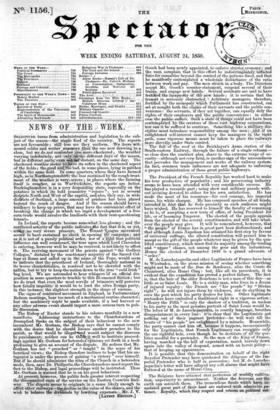NEWS OF THE WEEK.
Soirciro.un turns from administration and legislation to the sub- ject of the season—the staple food of the 'country. The reports are not favourable ; still less are they . uniform. IVA Imye,
n.esited colder and wetter' ;rummer§ pair the one now drawing t.c, a close, but we do flu remember 'One;More ;checkered ; the weather varying indefinitely, not onlnath: different days'of the season,
but in. different.parts; - aistant, on the sanie day. The
checkered weather seeinirta)ntie its reflex in the checkered aspect of the fields ; the good audithe bad, in some places, lying in patches within the same field. In some quarters, where they have farmed high, as in Northamptenshifbr the loss sustained by the rough treat- ment of the weather is very, severe; in places where the farming itself is rougher, di in Warwick:shire; the reports are better. Buckinghamshire_ is in a very desPoildifig state; especially On the potatoes in which its bold peasantry " rejoice "; yet in several districts North and West of the capital, aml also, they say, in wide disticts of Scotland, a large amount of produce has been platted beyond the reach of danger. • And if the season slink' haven tendency to keep up prices, that may have the convenient effect‘Of breaking the change in which too rapid a development of a free corn-trade would involve the landlords with their rent-questioning tenants.
In Ireland; the reports. become somewhat; less gloomy ; and the continued activity of the public Mande e feet that it it-, as yet, u no very severe pressure. The Tenant 'League Movement
seem to have sustained. no check in Opening campaign ; and
as it is not of a purely political order, nor of altjAd that political influence can well counteract; the tons upon whieli-Lord Clarendon is entering, however well he May-be-received, is nut likely to affect it. • The reviving Movement bf the priests against "the Godless Colleges," dictated by the reactionary majority of the Sacred Col: loge at Rome and called up in the name of the Pope, would seem to indicate that the priesthood of Ireland, thoroughly national in its iworse characteristics, is resolved not to be elevated with the nation, but tO try to keep the nation down to the true "mild Irish" bog leveL We are astounded to hear whispers Of an official dis- position in some quarters to truckle to this fll-omened faction; but we do trust that even the most servile of 'trimmers will perceive how fatally impolitic it would be to lend the ultra lion* party, in this instance, the slightest strength in the shape of success. The signs of -continued movement in England, in Parliamentary Reform meetings, bear too much of a mechanical routine character but the maehiner-y. Might be made available, if a bad harvest or any other adverse event should impart a more serious tarn to pub- lic discussion.
The Bishop of Exeter stands to his colours manfully in a new Manifesto. Addressing inetruetions to the Churchwardens of Bmmpford Speke on the subject of their behaviour to the new incumbent Mr. Gorham, the Bishop says that he cannot comply with the desire that he should license another preacher to the parish, as that would be illegal:amid would subject the diocesan to punishment; neither can he thilkit well to institute Proceed- ings against Mr. Gorham for heterodox opinions set forth in a book professing to give an account of the dispute. He notices that Mr. Gorham has not "preached" or "taught" in the sense of his heretical views ; the Bishop therefore inclines to hope that his an- tagonist is under the process of gaining "a victory" over himself. But if he should administer the rites of the Church in a heterodox Mode, then, says Dr. Phillpotts,the Churchwardens mustreport the fact to the Bishop, and legal proceedings will be instituted. Thus Mr. Gorham is warned that he is on his good behaviour.
At present, however, the public feels greater interest respecting the disorganized state of the service on the Eastern Counties Rail- way. The dispute seems to originate in a cause likely enough to affect other railways—thkdecline lathe value of the shares, and the wish to balance the dividends by lowering expenses.....,.... Mr. X. 'V.
Gooch had been newly appointed, to enforce strictes,sconamy;' and the man complain that in this effort he indisliimniatalyinfileted fines for casualties beyond the control of-the-poisons fined, and that he manifestly contemplated a w1Mleiale..disturbanoe of the ratio between work and pay. The men struck in a body. The Directors acypt Mr. Gooch 's counter-statenient, suspend several of their trains, and engage new hsids Several accidents are said to have testified the hoity Of the new hands; it is certain that the _transit is aeriously obstructed.1- Arbitrary managers, therefore, fortified by the monopoly ivhieh'Pailiament has constructed, can set at nought both the claims of their servantsand the public con- venience: the servants, if they act together, can equally defy the rights of their employers and the public -:Convenience: in either case-the riblM suffers. Such a State Of thin&‘ceiild: not have been ..contemplated by the creators of .these.iiiat -highway eilgeritione, ri --nor cam it be suffered to continue. Something like a .military. Iline Must introduce responsibility among the men .; an path,- some vigorous means must be taken to place the'railtpaya e ightened self-interest cannot keep the manatrs in the light alcf9 airectfy, nader State control. 'The fall -of the roof at the Bricklayer's Arms station of the BOuth-eastern Railway, through the failure of a single- column-:-- so close does the contract plan shave to the extreme verge of se- eurity—although not very fatal, is another sign of the unsoundneas that pervades the management and works of the railway system. In fact, eommon trade influences are not adequate to enforcing a proper administration of these great public highways.


























